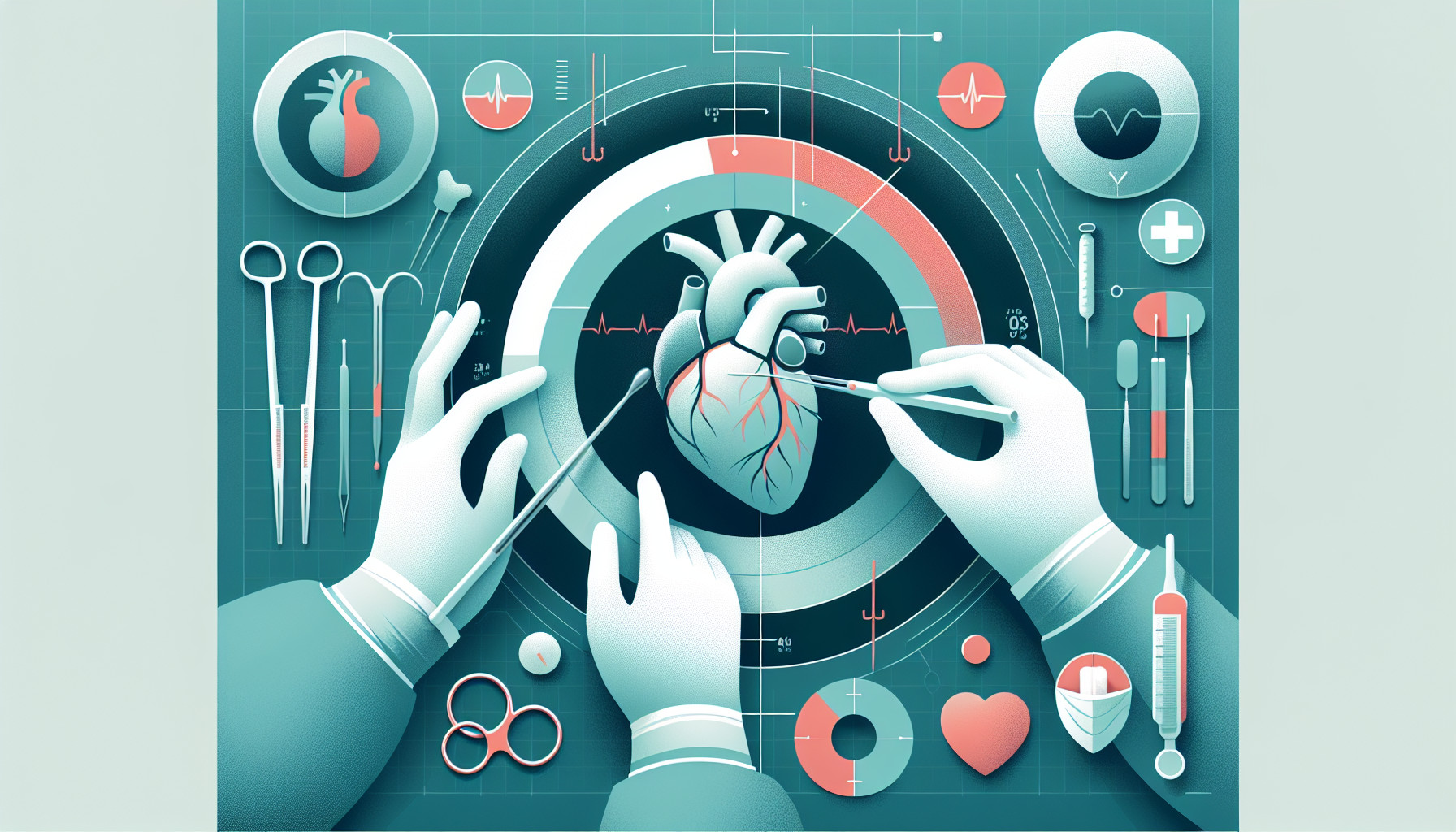Our Summary
This research paper discusses a condition called atrioventricular (AV) block that can sometimes happen as a result of certain heart-related procedures. These procedures include heart surgery, particularly surgeries involving the aortic and mitral valves, and procedures that involve the use of a catheter. A catheter is a thin, flexible tube that’s inserted into the body to treat diseases or perform a surgical procedure.
The paper highlights that people who undergo these procedures are at a higher risk of developing AV block, a condition where the electrical signals between the chambers of the heart are blocked or delayed. This can lead to a slower heart rate and other complications, which might require the implantation of a pacemaker, a small device that helps the heart beat at a normal rate.
The aim of the paper is to summarize the common reasons why this condition can occur after these procedures, how to predict if it might occur, and general ideas for managing it.
FAQs
- What is iatrogenic atrioventricular (AV) block and what procedures can cause it?
- Which type of patients are at the highest risk for developing perioperative AV block?
- What are some of the common predictors and management considerations for AV block?
Doctor’s Tip
One helpful tip a doctor might tell a patient about cardiac ablation is to be aware of the potential risk of developing atrioventricular (AV) block as a complication of the procedure. AV block can occur in the context of cardiac surgery, transcatheter procedures, or electrophysiologic procedures. Patients should discuss the risk of AV block with their doctor before undergoing cardiac ablation and be prepared for the possibility of needing a permanent pacemaker implantation. Regular follow-up appointments with a cardiologist are important to monitor for any signs or symptoms of AV block and to adjust treatment as needed.
Suitable For
Patients with certain types of arrhythmias, such as atrioventricular nodal re-entrant tachycardia, septal accessory pathways, para-Hisian atrial tachycardia, or premature ventricular complexes, may be recommended for cardiac ablation. Additionally, patients who are at high risk for developing atrioventricular block during cardiac surgery, transcatheter valve procedures, or electrophysiologic procedures may also be candidates for cardiac ablation. These patients may benefit from ablation to correct their arrhythmias and prevent further complications related to atrioventricular block.
Timeline
Before cardiac ablation:
- Patient is recommended for cardiac ablation due to recurrent abnormal heart rhythms (arrhythmias).
- Patient undergoes pre-procedure testing, such as electrocardiogram (ECG) and echocardiogram, to evaluate the heart’s electrical activity and structure.
- Patient may need to stop certain medications prior to the procedure.
- Patient is instructed on fasting guidelines before the procedure.
After cardiac ablation:
- Patient is monitored closely in a recovery area immediately after the procedure.
- Patient may experience some discomfort at the catheter insertion site.
- Patient is usually discharged the same day or within a day after the procedure.
- Patient may be prescribed medications to manage any post-procedure symptoms, such as discomfort or arrhythmias.
- Patient is advised to rest and avoid strenuous activities for a period of time post-procedure.
- Patient follows up with their healthcare provider for monitoring and evaluation of the procedure’s effectiveness in reducing or eliminating arrhythmias.
What to Ask Your Doctor
- What is cardiac ablation and how does it work?
- What are the potential risks and complications associated with cardiac ablation, including the risk of developing atrioventricular (AV) block?
- What are the specific factors that may increase my risk of developing AV block during or after the procedure?
- How common is AV block as a complication of cardiac ablation?
- What are the symptoms of AV block and how will it be monitored and managed if it occurs?
- What is the likelihood of needing a permanent pacemaker if AV block occurs after cardiac ablation?
- Are there any steps that can be taken during the procedure to reduce the risk of AV block?
- How long is the recovery period after cardiac ablation and what follow-up care will be necessary?
- Are there any lifestyle changes or medications that should be avoided or adjusted after cardiac ablation to reduce the risk of AV block?
- Are there any alternative treatments or procedures that could be considered instead of cardiac ablation?
Reference
Authors: Cheung CC, Mori S, Gerstenfeld EP. Journal: Cardiol Clin. 2023 Aug;41(3):419-428. doi: 10.1016/j.ccl.2023.03.009. PMID: 37321692
